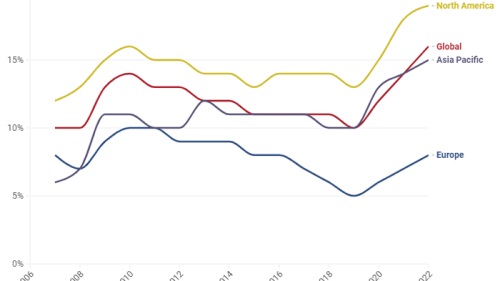Is it better to be the tortoise or the hare? The Emerging Trends in Real Estate® 2018 report predicts slower but more sustainable growth for the U.S. real estate market, based on 2 percent annual gross domestic product (GDP) growth and 1 percent job growth. The report was released by PwC and ULI at the 2017 ULI Fall Meeting in Los Angeles.
“For the first time in five years, people feel comfortable with the cycle; about 80 percent of survey respondents expect good to excellent profitability,” noted PwC’s Andrew Warren, in summarizing the report during a panel discussion. “The key to the next few years is expanding horizons.”
Those new horizons are likely to be in smaller and secondary markets, the report asserts. “The growing interest in smaller cities by real estate investors is influenced by their relative affordability, coupled with a concentration of young, skilled workers,” said panelist Mitch Roschelle, partner and business development leader at PwC. “The diverse, robust economies of these smaller cities make them very desirable to investors.”
The report names Seattle as the nation’s top market, thanks to its job opportunities, diverse economy, and educated workforce. The city, ranked fourth last year, ends the reign of Texas cities taking first place for the past three years. Austin, which came in first place last year, went down a notch to number two. Dallas/Fort Worth, which was 2016’s top pick, is now in fifth place.
Houston, the nation’s top market in the 2015 report, plunged to 60th place due to disruption in the energy industry. (This year’s report was prepared prior to Hurricane Harvey and Hurricane Irma.) Manhattan experienced the largest year-over-year downward slide to number 46, due to its high cost of assets and oversaturation of construction.
Salt Lake City (number three) and Fort Lauderdale (number six) jumped into the top ten for the first time in the study’s history, as investors look to replicate the success of Denver and Miami with their competitive living costs and high quality of life. Salt Lake City is the smallest market ever to make the top ten.
“Secondary markets have dominated population growth in last decade, with higher levels of in-migration than gateway cities,” commented panelist Mary Ludgin, managing director and head of global research at Heitman. “After the recession, people moved to gateway markets as a safe haven. But with the exception of New York City, gateway markets have not performed as well as expected during economic downturns.”
If gateway cities have not fared well in bad times, how will fast-growing secondary markets perform? “I don’t think slow economic growth will be good for secondary cities, because civil infrastructure depends on wealth expansion, especially in growing markets,” said panelist Christopher Ward, executive vice president and chief executive for AECOM’s metro New York region. “Just look at Seattle’s clogged roads, Austin’s mass transit crisis, and Salt Lake City’s lack of public transportation.” Panelist Kate Bicknell, vice president of development at Forest City in New York City, pointed to potential headwinds from the fact that the economic recovery has benefited Americans unequally.
Top trends identified by the report include the following:
- Generation Z will affect the future of retail and work space: Stores will need to transform to meet the “gadgeteria” ethos of this new generation with omni-channel marketing and Instagrammable shopping experiences. And where millennials have driven the move toward open, collaborative workspaces, gen Z appears to want more structure and privacy, suggesting a return to more personal office space.
- Housing shortages loom: With generations Y and Z comprising over 150 million members, plus baby boomers remaining in their homes longer, housing shortages will grow in desirable markets. Homebuilders will have the opportunity to introduce innovative products to meet these needs, but they will face obstacles in the form of labor shortages and the high cost of building materials.
- Multifamily remains a strong investment: With millennials’ and gen Z’s growing need for more affordable rental apartments, multifamily housing prospects remain strong, especially in secondary markets like Pittsburgh, Salt Lake City, and Fort Lauderdale.
- Senior housing momentum will grow: Senior housing tops the list of the most promising residential segments, with a present inventory that does not meet the needs of a group projected to grow by 25 million in the next 15 years.
The top ten markets are as follows:
- Seattle, Washington;
- Austin, Texas;
- Salt Lake City, Utah;
- Raleigh/Durham, North Carolina;
- Dallas/Fort Worth, Texas;
- Fort Lauderdale, Florida;
- Los Angeles, California;
- San Jose, California;
- Nashville, Tennessee; and
- Boston, Massachusetts.
The 2018 report includes interviews with and survey responses from more than 1,600 leading real estate experts, including investors, fund managers, developers, property companies, lenders, brokers, advisers, and consultants.





